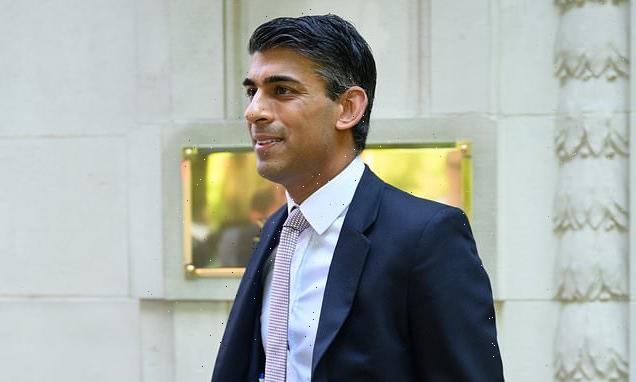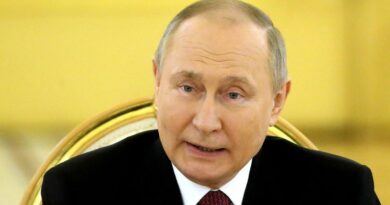Inflation will give Treasury a £60billion boost by 2025, experts say
Tax cuts AREN’T a fairytale, Rishi! Economic experts say inflation will give Treasury a £60billion boost by 2025
- Rising wages and rising taxes mean inflation is set to drive up the tax collected
- But ex-chancellor Rishi Sunak told Liz Truss last week tax cuts are a ‘fairytale’
- The £60 billion takes into account higher spending to combat the cost of living
Red-hot inflation means the Treasury is set to take £60billion more in taxes by 2025 than it is now predicting, a leading think-tank has calculated.
Rising wages and prices, combined with controversial tax grabs introduced by former chancellor Rishi Sunak, will help pull in vast amounts of cash, according to the Centre for Economics and Business Research (CEBR).
This will give the next prime minister enough breathing room to slash Britain’s crippling tax burden, the CEBR said.
But the research is at odds with the policies of Mr Sunak, who is hoping to replace Boris Johnson in No 10.
Rising wages and prices, combined with controversial tax grabs introduced by former chancellor Rishi Sunak, will help pull in vast amounts of cash, according to the Centre for Economics and Business Research (CEBR)
Mr Sunak has been reluctant to reverse the tax hikes he introduced as chancellor, including the highly controversial National Insurance rise
Mr Sunak has been reluctant to reverse the tax hikes he introduced as chancellor, which included a rise in national insurance contributions and a freezing of the thresholds at which people must pay income tax.
He has also warned that tax cuts would have to be funded by borrowing and that ‘borrowing your way out of inflation is a fairytale’.
But his leadership rivals such as Foreign Secretary Liz Truss have pledged faster tax cuts in an effort to boost Britain’s growth.
The rise in national insurance contributions from April was a ‘mistake’, Miss Truss has said.
She added: ‘I think it’s even more of a mistake now, where we are facing such strong economic headwinds.’
Referring to the tax burden, which is set to rise to the highest level since the 1950s, former Tory leader Sir Iain Duncan Smith, who is backing Miss Truss, said: ‘We go from the top of the G7 leaderboard in terms of growth this year to the bottom next year, and this is why.
‘Cutting taxes six months before an election is no good – we need to show we are a party who can cut taxes now.’
While Mr Sunak has suggested that slashing taxes would not be ‘responsible’, the CEBR’s research has thrown his claim into doubt. When the former chancellor initially froze income tax thresholds last year, he was not expecting wages to rise as rapidly as they are now.
The soaring cost of living has led employees to demand higher pay, and while wages are still not keeping up with inflation, they are climbing.
Yet in a ‘stealth tax’, income tax thresholds have not risen in line with salaries, meaning more workers are being dragged into paying the levy.
By the 2024/25 financial year, the CEBR thinks 36.4million workers will be paying income tax, and 9million – more than one in four people in employment – will be paying the 40 per cent higher rate.
Douglas McWilliams, deputy chairman of the CEBR, said: ‘Since these receipts will come from the effects of inflation and fiscal drag, meaning that people will be paying more tax than expected, it would not be unreasonable for the additional revenues to be used for tax cuts’
This is 200,000 more paying income tax and a further 200,000 paying the higher rate than the Government’s Budget watchdog forecast in March. Higher prices, which have been pushed up by Covid and the war in Ukraine, will also bring in more money from VAT.
The levy is charged on most goods at 20 per cent – but the higher the price of the goods, the more money the Government will take. The CEBR also thinks economic growth will be higher by 2024/25 than the Office for Budget Responsibility pessimistically assumes. This will automatically boost the Treasury’s coffers, as companies pay more corporation tax.
Even if the Government is forced to spend more on helping Britons survive a tough few years ahead, and higher inflation and interest rates bump up the cost of borrowing, the CEBR still believes the Treasury will end up with £60billion more to play with in the 2024/25 financial year than it thinks.
Douglas McWilliams, deputy chairman of the CEBR, said: ‘Since these receipts will come from the effects of inflation and fiscal drag, meaning that people will be paying more tax than expected, it would not be unreasonable for the additional revenues to be used for tax cuts.’
The CEBR’s research comes as the Tory tax row turned toxic. Miss Truss and Mr Sunak clashed over tax in the first TV debate on Friday, when she savaged him over his national insurance rise. The Foreign Secretary argued that ‘you cannot tax your way to growth’ while Mr Sunak told her: ‘Borrowing your way out of inflation is a fairytale.’
Miss Truss has vowed to axe green levies on energy bills, cancel the corporation tax hike from 19 per cent to 25 per cent next year and reverse the hike in national insurance, which was introduced in April.
Source: Read Full Article







